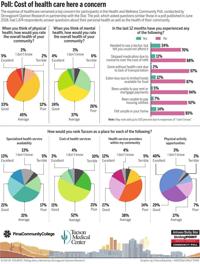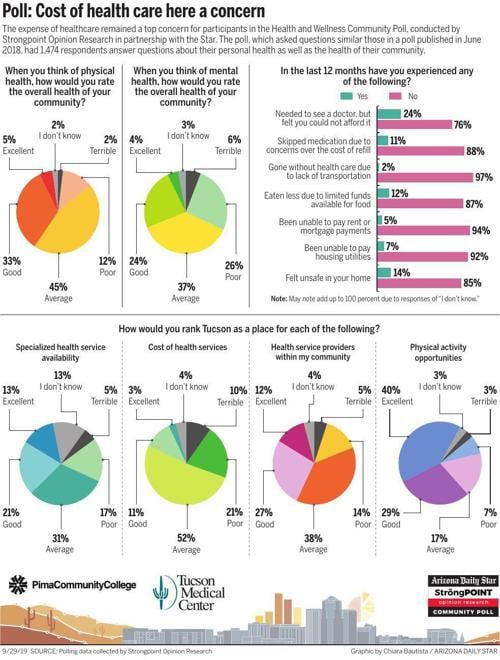About 11% of Tucson-area residents in a new community poll say they have rationed their medications in the past year because of the high cost of prescription drugs.
The cost of doctor visits and medications continue to be the single most substantial barrier when it comes to seeking care, the health and wellness poll conducted by Strongpoint Opinion Research in partnership with the Star shows.
The poll goes on to show that 24% of the 1,474 respondents said they needed to see a doctor but felt they could not afford it. And 12% said they skipped meals because of limited funds available for food. And 56% of respondents say the financial burden of health care is an extremely important issue that needs to be addressed in the community.
The poll results are similar to a survey on healthcare by Strongpoint and the Star in June 2018. That poll found about 28% of Tucson-area residents said they decided not to seek medical care because they could not afford it.
There is some positive health news in the poll.
About 77% of those surveyed rated the availability of healthcare providers in the area between average and excellent.
When it comes to specialized medicine, the approval rating within the same range dips slightly to 65%.
About 98% of the respondents said they had medical insurance.
“This is not surprising at all,” said Dr. Francisco Garcia, an assistant county administrator for Pima County.
The poll results generally reflects the on-the-ground realities across Pima County, Garcia said.
Even for people with insurance, managing insurance claims, changing deductibles and guidelines for health savings accounts have made handling personal healthcare more complicated, he said.
New plans coming into the healthcare marketplace at the same time that the Affordable Care Act is being dismantled is likely to make the problem worse, Garcia said.
“Healthy people are trying to avoid paying for insurance and healthcare companies are trying to extract more value for their services,” he said.
With roughly 18% of the county population living below the federal poverty line, affordability is a chronic problem in Pima County.
“(Healthcare costs) disproportionally affect people on the lower end of the spectrum, he said, “Vulnerable people are more likely to be suffering than the higher end of the spectrum.”
As for the poll showing relatively high satisfaction rate for healthcare in the community, Garcia says he’s wary of the result.
“Most of us don’t interact with healthcare frequently, so for most of us, it represents a very, very small part of their lives,” Garcia said.
A survey for people with a chronic medical condition, he says, would find a very different set of results.





